The Cambridge History of China. Vol. 12: Republican China, 1912-1949, Part 1
Подождите немного. Документ загружается.

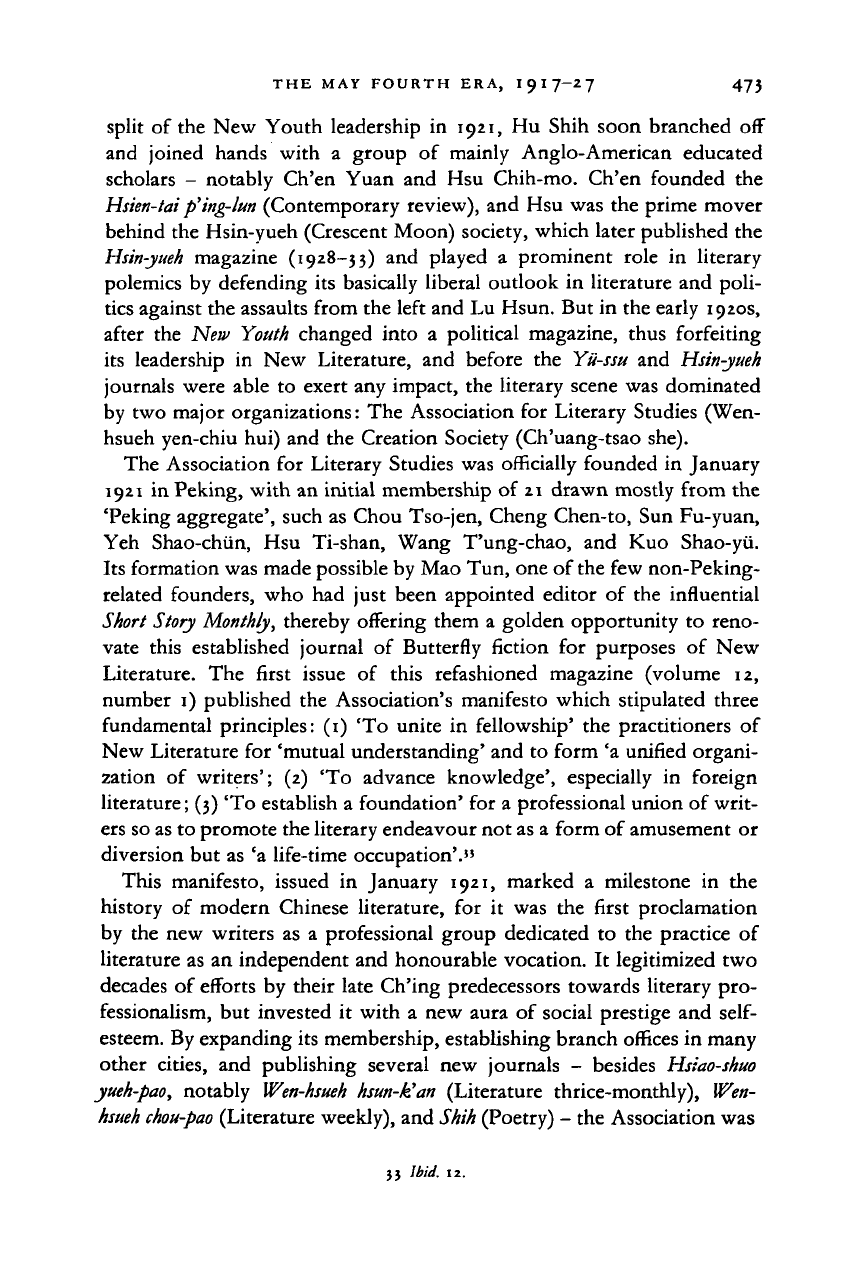
THE MAY FOURTH ERA, I 9 I 7-2 7 473
split of the New Youth leadership in 1921, Hu Shih soon branched off
and joined hands with a group of mainly Anglo-American educated
scholars - notably Ch'en Yuan and Hsu Chih-mo. Ch'en founded the
Hsien-tai
p'ing-lun
(Contemporary review), and Hsu was the prime mover
behind the Hsin-yueh (Crescent Moon) society, which later published the
Hsin-yueh
magazine (1928-33) and played a prominent role in literary
polemics by defending its basically liberal outlook in literature and poli-
tics against the assaults from the left and Lu Hsun. But in the early 1920s,
after the New Youth changed into a political magazine, thus forfeiting
its leadership in New Literature, and before the Yii-ssu and
Hsin-yueh
journals were able to exert any impact, the literary scene was dominated
by two major organizations: The Association for Literary Studies (Wen-
hsueh yen-chiu hui) and the Creation Society (Ch'uang-tsao she).
The Association for Literary Studies was officially founded in January
1921 in Peking, with an initial membership of
21
drawn mostly from the
'Peking aggregate', such as Chou Tso-jen, Cheng Chen-to, Sun Fu-yuan,
Yeh Shao-chiin, Hsu Ti-shan, Wang T'ung-chao, and Kuo Shao-yii.
Its formation was made possible by Mao Tun, one of the few non-Peking-
related founders, who had just been appointed editor of the influential
Short Story
Monthly,
thereby offering them a golden opportunity to reno-
vate this established journal of Butterfly fiction for purposes of New
Literature. The first issue of this refashioned magazine (volume 12,
number 1) published the Association's manifesto which stipulated three
fundamental principles: (1) 'To unite in fellowship' the practitioners of
New Literature for 'mutual understanding' and to form 'a unified organi-
zation of writers'; (2) 'To advance knowledge', especially in foreign
literature; (3) 'To establish a foundation' for a professional union of writ-
ers so as to promote the literary endeavour not as a form of amusement or
diversion but as 'a life-time occupation'."
This manifesto, issued in January 1921, marked a milestone in the
history of modern Chinese literature, for it was the first proclamation
by the new writers as a professional group dedicated to the practice of
literature as an independent and honourable vocation. It legitimized two
decades of efforts by their late Ch'ing predecessors towards literary pro-
fessionalism, but invested it with a new aura of social prestige and
self-
esteem. By expanding its membership, establishing branch offices in many
other cities, and publishing several new journals - besides
Hsiao-shuo
yueh-pao, notably
Wen-hsueh
hsun-k'an (Literature thrice-monthly), Wen-
hsueh chou-pao
(Literature weekly), and Shih (Poetry) - the Association was
33
Ibid.
12.
Cambridge Histories Online © Cambridge University Press, 2008
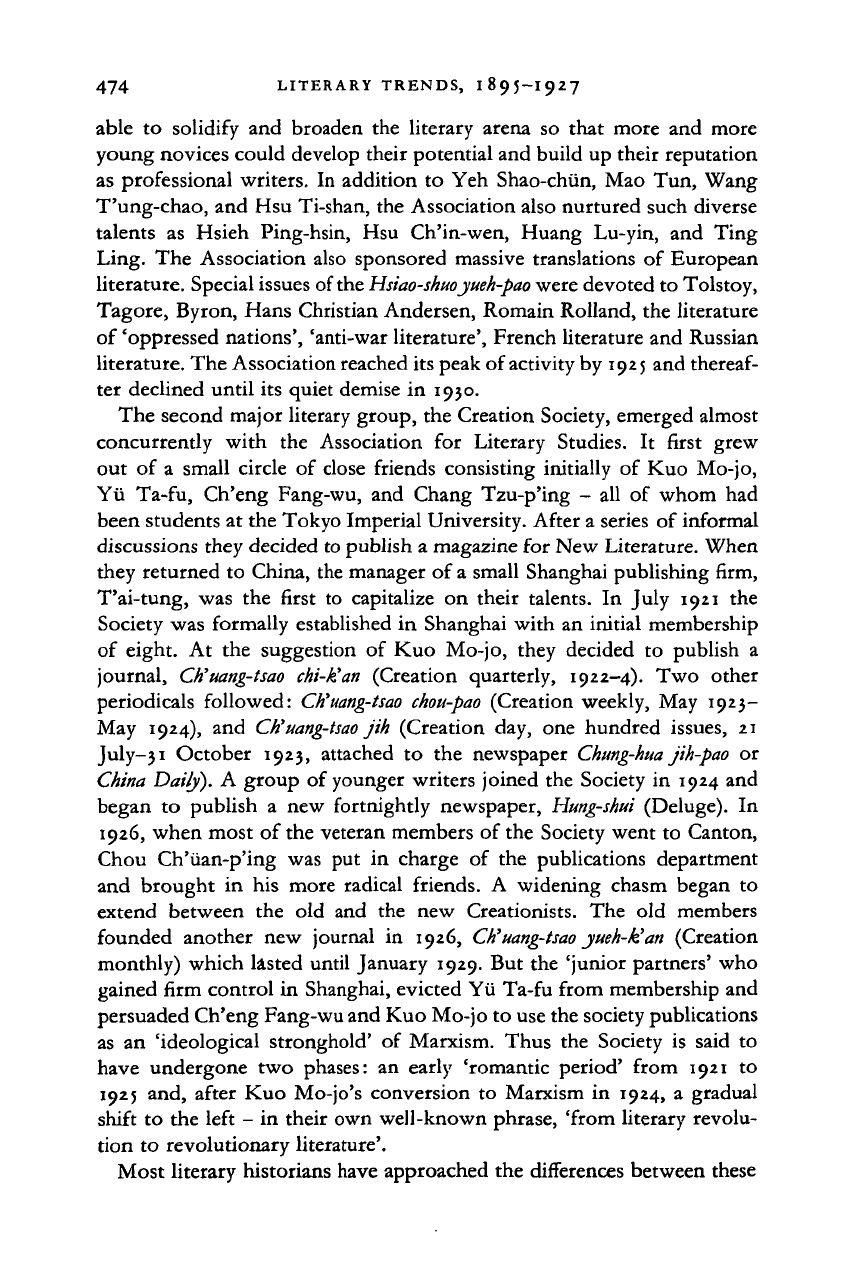
474 LITERARY TRENDS, 1895-I927
able
to
solidify and broaden the literary arena
so
that more and more
young novices could develop their potential and build up their reputation
as professional writers. In addition
to
Yeh Shao-chiin, Mao Tun, Wang
T'ung-chao, and Hsu Ti-shan, the Association also nurtured such diverse
talents
as
Hsieh Ping-hsin,
Hsu
Ch'in-wen, Huang Lu-yin, and Ting
Ling. The Association also sponsored massive translations
of
European
literature. Special issues of the
Hsiao-shuojueh-pao
were devoted to Tolstoy,
Tagore, Byron, Hans Christian Andersen, Romain Rolland, the literature
of 'oppressed nations', 'anti-war literature', French literature and Russian
literature. The Association reached its peak of activity by 1925 and
thereaf-
ter declined until its quiet demise in 1930.
The second major literary group, the Creation Society, emerged almost
concurrently with
the
Association
for
Literary Studies.
It
first grew
out
of a
small circle
of
close friends consisting initially
of
Kuo Mo-jo,
Yii Ta-fu, Ch'eng Fang-wu, and Chang Tzu-p'ing
-
all
of
whom had
been students at the Tokyo Imperial University. After a series of informal
discussions they decided to publish a magazine for New Literature. When
they returned to China, the manager of a small Shanghai publishing firm,
T'ai-tung, was
the
first
to
capitalize
on
their talents.
In
July 1921
the
Society was formally established in Shanghai with an initial membership
of eight.
At
the suggestion
of
Kuo Mo-jo, they decided
to
publish
a
journal,
Ch'uang-tsao
chi-k'an (Creation quarterly, 1922—4). Two other
periodicals followed:
Ch'uang-tsao chou-pao
(Creation weekly, May 1923-
May 1924), and
Ch'uang-tsao
jih (Creation day, one hundred issues,
21
July-31 October 1923, attached
to the
newspaper
Chung-hua jih-pao
or
China
Daily).
A
group of younger writers joined the Society in 1924 and
began
to
publish
a
new fortnightly newspaper,
Hung-shui
(Deluge).
In
1926,
when most of the veteran members of the Society went to Canton,
Chou Ch'iian-p'ing was
put in
charge
of
the publications department
and brought
in
his more radical friends.
A
widening chasm began
to
extend between
the old
and
the
new Creationists. The
old
members
founded another new journal
in
1926,
Ch'uang-tsao yueh-k'an
(Creation
monthly) which lasted until January 1929. But the 'junior partners' who
gained firm control in Shanghai, evicted Yii Ta-fu from membership and
persuaded Ch'eng Fang-wu and Kuo Mo-jo to use the society publications
as
an
'ideological stronghold'
of
Marxism. Thus the Society
is
said
to
have undergone two phases:
an
early 'romantic period' from 1921
to
1925 and, after Kuo Mo-jo's conversion
to
Marxism
in
1924,
a
gradual
shift to the left
-
in their own well-known phrase, 'from literary revolu-
tion to revolutionary literature'.
Most literary historians have approached the differences between these
Cambridge Histories Online © Cambridge University Press, 2008
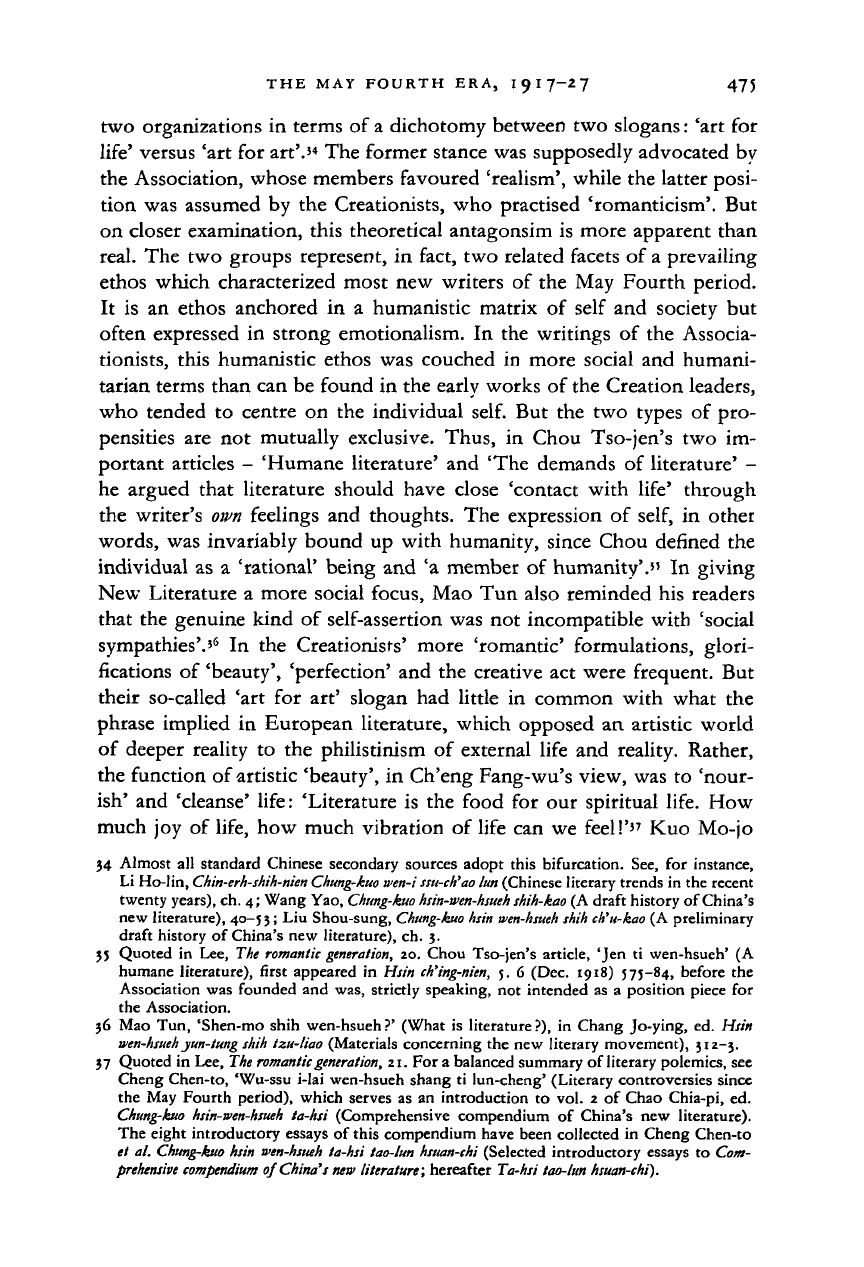
THE
MAY
FOURTH
ERA, I 9 I 7-2 7 475
two organizations
in
terms
of
a dichotomy between
two
slogans:
'art for
life'
versus
'art for
art'.'
4
The
former stance
was
supposedly advocated
by
the Association, whose members favoured 'realism', while
the
latter posi-
tion
was
assumed
by the
Creationists,
who
practised 'romanticism'.
But
on closer examination, this theoretical antagonsim
is
more apparent than
real.
The two
groups represent,
in
fact,
two
related facets
of
a prevailing
ethos which characterized most
new
writers
of the May
Fourth period.
It
is an
ethos anchored
in a
humanistic matrix
of
self
and
society
but
often expressed
in
strong emotionalism.
In the
writings
of the
Associa-
tionists, this humanistic ethos
was
couched
in
more social
and
humani-
tarian terms than
can be
found
in the
early works
of
the Creation leaders,
who tended
to
centre
on the
individual
self. But the two
types
of pro-
pensities
are not
mutually exclusive. Thus,
in
Chou Tso-jen's
two im-
portant articles
-
'Humane literature'
and 'The
demands
of
literature'
-
he argued that literature should have close 'contact with life' through
the writer's
own
feelings
and
thoughts.
The
expression
of self, in
other
words,
was
invariably bound
up
with humanity, since Chou defined
the
individual
as a
'rational' being
and 'a
member
of
humanity'."
In
giving
New Literature
a
more social focus,
Mao Tun
also reminded
his
readers
that
the
genuine kind
of
self-assertion
was not
incompatible with 'social
sympathies'.'
6
In the
Creationists' more 'romantic' formulations, glori-
fications of 'beauty', 'perfection'
and the
creative
act
were frequent.
But
their so-called
'art for art'
slogan
had
little
in
common with what
the
phrase implied
in
European literature, which opposed
an
artistic world
of deeper reality
to the
philistinism
of
external life
and
reality. Rather,
the function
of
artistic 'beauty',
in
Ch'eng Fang-wu's view,
was to
'nour-
ish'
and
'cleanse' life: 'Literature
is the
food
for our
spiritual life.
How
much
joy of
life,
how
much vibration
of
life
can we
feel!'
37
Kuo
Mo-jo
34 Almost
all
standard Chinese secondary sources adopt this bifurcation.
See, for
instance,
Li Ho-lin,
Chin-erh-shih-nien Chung-kuo wen-i ssu-ch'ao
lun (Chinese literary trends
in the
recent
twenty years),
ch. 4;
Wang Yao,
Chung-kuo hsin-tven-hsueh shih-kao
(A
draft history
of
China's
new literature), 40-5
3;
Liu
Shou-sung,
Chung-kuo hsin wm-hsueh
shih ch'u-kao
(A
preliminary
draft history
of
China's
new
literature),
ch. 3.
35 Quoted
in Lee, The
romantic
generation,
20.
Chou Tso-jen's article,
'Jen ti
wen-hsueh'
(A
humane literature), first appeared
in
Hsin
ch'ing-nien,
5. 6 (Dec. 1918)
575-84, before
the
Association
was
founded
and was,
strictly speaking,
not
intended
as a
position piece
for
the Association.
36
Mao Tun,
'Shen-mo shih wen-hsueh?' (What
is
literature?),
in
Chang Jo-ying,
ed.
Hsin
wen-hsuehyun-tung shih
tzu-liao (Materials concerning
the new
literary movement),
312-3.
37 Quoted
in
Lee, The romantic
generation,
21.
For a
balanced summary
of
literary polemics,
see
Cheng Chen-to, 'Wu-ssu i-lai wen-hsueh shang
ti
lun-cheng' (Literary controversies since
the
May
Fourth period), which serves
as an
introduction
to vol. 2 of
Chao Chia-pi,
ed.
Chung-kuo
hsin-wen-hsueh
ta-hsi (Comprehensive compendium
of
China's
new
literature).
The eight introductory essays
of
this compendium have been collected
in
Cheng Chen-to
el
al.
Chung-kuo hsin
wen-hsueh
ta-hsi tao-lun hsuan-M (Selected introductory essays
to Com-
prehensive compendium
of China's
new
literature; hereafter Ta-hsi
tao-lun
hsuan-chi).
Cambridge Histories Online © Cambridge University Press, 2008
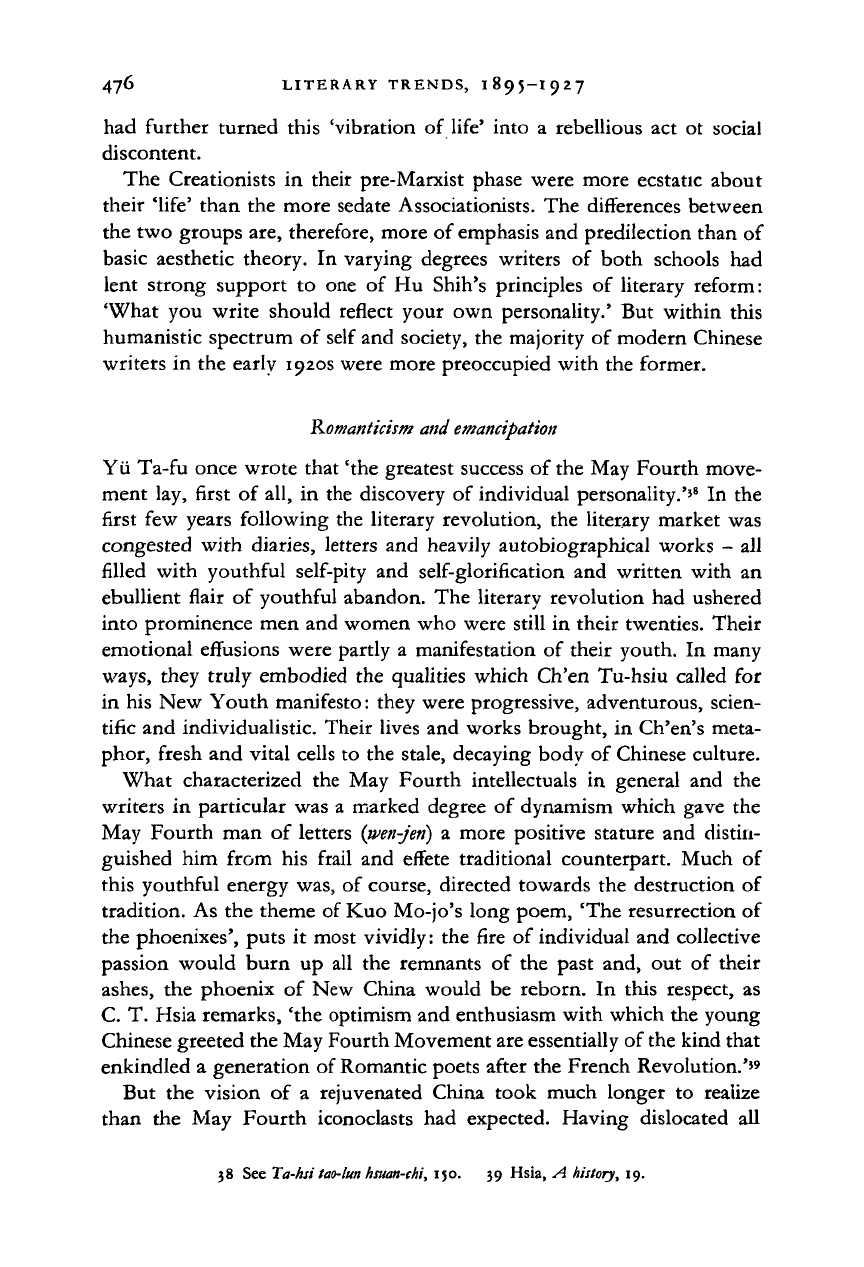
476 LITERARY TRENDS, 1895-I927
had further turned this 'vibration
of
life' into
a
rebellious act
ot
social
discontent.
The Creationists
in
their pre-Marxist phase were more ecstatic about
their 'life' than the more sedate Associationists. The differences between
the two groups are, therefore, more of emphasis and predilection than of
basic aesthetic theory.
In
varying degrees writers
of
both schools
had
lent strong support
to
one
of
Hu Shih's principles
of
literary reform:
'What you write should reflect your own personality.' But within this
humanistic spectrum
of
self and society, the majority of modern Chinese
writers in the early 1920s were more preoccupied with the former.
Romanticism and
emancipation
Yii Ta-fu once wrote that 'the greatest success of the May Fourth move-
ment lay, first of all,
in
the discovery of individual personality.''
8
In
the
first few years following the literary revolution, the literary market was
congested with diaries, letters and heavily autobiographical works
-
all
filled with youthful self-pity and self-glorification and written with
an
ebullient flair
of
youthful abandon. The literary revolution had ushered
into prominence men and women who were still in their twenties. Their
emotional effusions were partly
a
manifestation
of
their youth.
In
many
ways,
they truly embodied the qualities which Ch'en Tu-hsiu called for
in his New Youth manifesto: they were progressive, adventurous, scien-
tific and individualistic. Their lives and works brought, in Ch'en's meta-
phor, fresh and vital cells to the stale, decaying body of Chinese culture.
What characterized the May Fourth intellectuals
in
general and
the
writers
in
particular was
a
marked degree
of
dynamism which gave the
May Fourth man
of
letters
(wen-Jen)
a
more positive stature and distin-
guished him from his frail and effete traditional counterpart. Much
of
this youthful energy was, of course, directed towards the destruction of
tradition. As the theme of Kuo Mo-jo's long poem, 'The resurrection of
the phoenixes', puts
it
most vividly: the fire of individual and collective
passion would burn
up
all the remnants
of
the past and,
out of
their
ashes,
the phoenix
of
New China would
be
reborn.
In
this respect,
as
C. T. Hsia remarks, 'the optimism and enthusiasm with which the young
Chinese greeted the May Fourth Movement are essentially of the kind that
enkindled
a
generation of Romantic poets after the French Revolution.'
59
But the vision
of a
rejuvenated China took much longer
to
realize
than
the
May Fourth iconoclasts had expected. Having dislocated
all
38 See Ta-hii
tao-lun
hntan-chi,
150.
39
Hsia,
A
history, 19.
Cambridge Histories Online © Cambridge University Press, 2008

THE MAY FOURTH ERA, I 9 I 7-2 7 477
traditional ways and values, destroyed all faith and proper orientation,
the May Fourth writers found themselves in a cultural vacuum of a tran-
sitional period before a new system - the Thought of Mao Tse-tung - was
evolved. The political chaos of warlordism further exacerbated the situa-
tion by enhancing their sense of alienation. Cut off from political power
and lacking an organic contact with any social classes, the May Fourth
writer was compelled to fall back upon himself and to impose the values
of his own ego on the rest of society - all in the name of intellectual and
literary revolution.
For almost a decade, the keynote of this youthful emotional outburst
was summarized in the amorphous word, love. For the May Fourth
youths 'riding on the tempestuous storm of romanticism',
40
love had
become the central focus of their lives. The writers themselves were
leaders of this trend. It was considered
de rigueur
to produce some con-
fessional love pieces and to evolve a 'modern' (or
mo-teng,
in its chic
Chinese transliteration) lifestyle based on love. Thus the popular image
of the May Fourth writers was often that of a couple or even triangle
bound and complicated by love. The importance of the individual per-
sonality was given wide recognition by the amorous acts and styles of
such love-torn figures as Yii Ta-fu and Wang Ying-hsia, Hsu Chih-mo and
Lu Hsiao-man, Ting Ling and Hu Yeh-p'in. Love had become an overall
symbol of new morality, an easy substitute for the traditional ethos of
propriety which was now equated with conformist restraint. In the general
wave of emancipation, love was identified with freedom, in the sense
that by loving and by releasing one's passions and energies the individual
could become truly a full and free man - or woman. To love was also
considered an act of defiance and sincerity, of renouncing all the artificial
restraints of hypocritical society so as to find one's true self and expose it
to one's beloved. In this sense, the romantic mood of the 1920s was
completely secular and, in C. T. Hsia's criticism, 'philosophically un-
ambitious and psychologically crude': it failed 'to explore the deeper
reaches of the mind and to give allegiance to a higher transcendental or
immanent reality.'
41
But as an activistic ethos, romantic love had a particular bearing on
social movements. This was especially true of the movement for women's
liberation, which began at the turn of the century and reached a peak in
the 1920s. Again, new writers played a crucial role. The 'godfather' of
this movement was Hu Shih (who in his personal life was perhaps one of
40 This is the Creationist Cheng Po-ch'i's observation about the early May Fourth period.
See Ta-hsi tao-lun
hsuan-ehi,
94.
41
Hsia A history, 18.
Cambridge Histories Online © Cambridge University Press, 2008
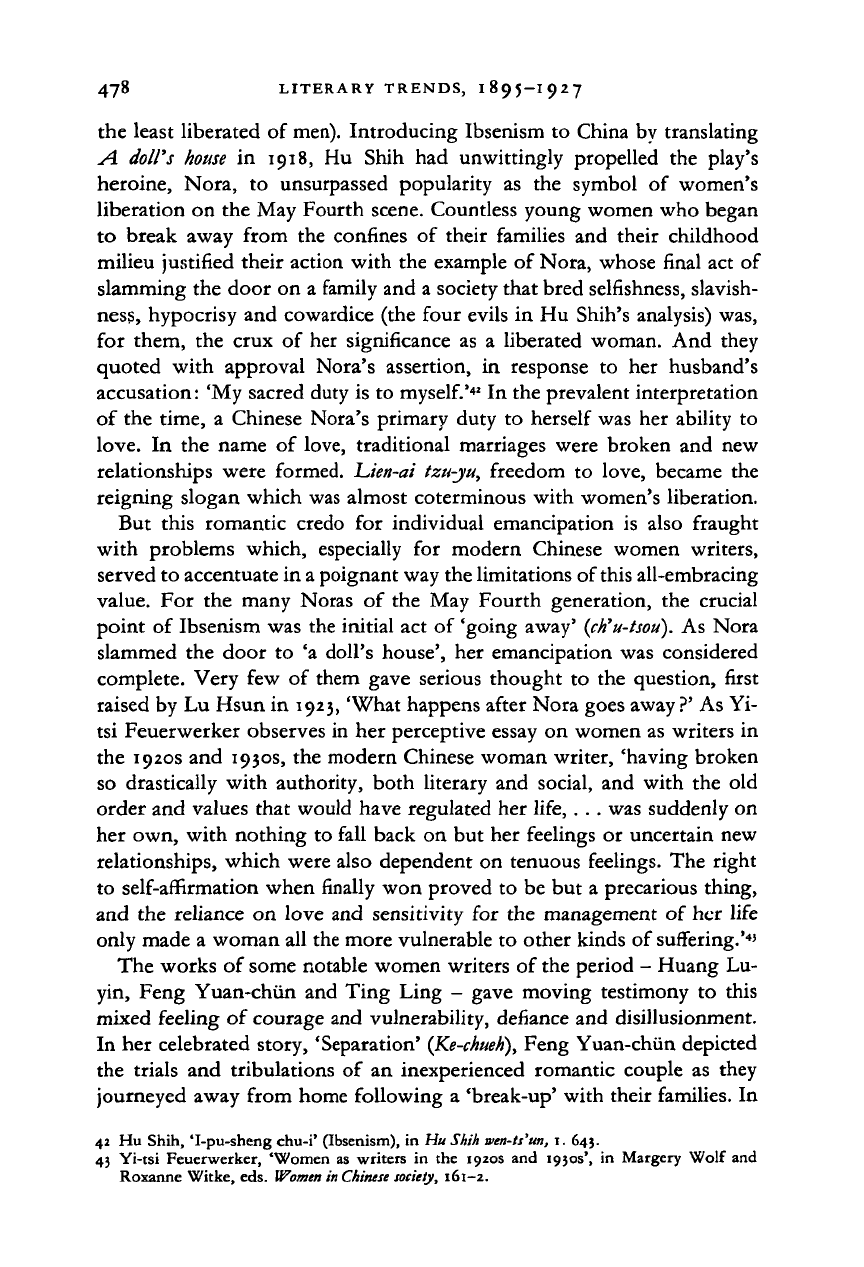
478 LITERARY TRENDS, 1895-1927
the least liberated of
men).
Introducing Ibsenism to China by translating
A.
doll's
house
in
1918,
Hu
Shih
had
unwittingly propelled
the
play's
heroine, Nora,
to
unsurpassed popularity
as the
symbol
of
women's
liberation on the May Fourth scene. Countless young women who began
to break away from the confines
of
their families and their childhood
milieu justified their action with the example of Nora, whose final act of
slamming the door on a family and a society that bred selfishness, slavish-
ness,
hypocrisy and cowardice (the four evils in Hu Shih's analysis) was,
for them, the crux
of
her significance
as a
liberated woman. And they
quoted with approval Nora's assertion,
in
response
to her
husband's
accusation: 'My sacred duty is to
myself.'
42
In the prevalent interpretation
of the time,
a
Chinese Nora's primary duty
to
herself was her ability
to
love.
In
the name
of
love, traditional marriages were broken and new
relationships were formed. Lien-ai tzu-yu, freedom
to
love, became
the
reigning slogan which was almost coterminous with women's liberation.
But this romantic credo
for
individual emancipation
is
also fraught
with problems which, especially
for
modern Chinese women writers,
served to accentuate in a poignant way the limitations of this all-embracing
value. For the many Noras
of
the May Fourth generation,
the
crucial
point of Ibsenism was the initial act
of
'going away'
(ch'u-tsou).
As Nora
slammed the door
to 'a
doll's house', her emancipation was considered
complete. Very few
of
them gave serious thought
to
the question, first
raised by Lu Hsun in 1923, 'What happens after Nora goes away ?' As Yi-
tsi Feuerwerker observes in her perceptive essay on women as writers in
the 1920s and 1930s, the modern Chinese woman writer, 'having broken
so drastically with authority, both literary and social, and with the old
order and values that would have regulated her life,
. . .
was suddenly on
her own, with nothing to fall back on but her feelings or uncertain new
relationships, which were also dependent on tenuous feelings. The right
to self-affirmation when finally won proved to be but
a
precarious thing,
and the reliance
on
love and sensitivity
for
the management
of
her life
only made a woman all the more vulnerable to other kinds of suffering.'
43
The works of some notable women writers of the period
-
Huang Lu-
yin, Feng Yuan-chun and Ting Ling
-
gave moving testimony
to
this
mixed feeling of courage and vulnerability, defiance and disillusionment.
In her celebrated story, 'Separation'
(Ke-chueh),
Feng Yuan-chun depicted
the trials and tribulations
of
an inexperienced romantic couple
as
they
journeyed away from home following
a
'break-up' with their families. In
42 Hu Shih, 'I-pu-sheng chu-i' (Ibsenism), in Hu
Shih
aen-ts'un,
i.
643.
43 Yi-tsi Feuerwerker, 'Women
as
writers
in
the 1920s and 1930s',
in
Margery Wolf and
Roxanne Witke, eds.
Women
in
Chinese
society,
161-2.
Cambridge Histories Online © Cambridge University Press, 2008
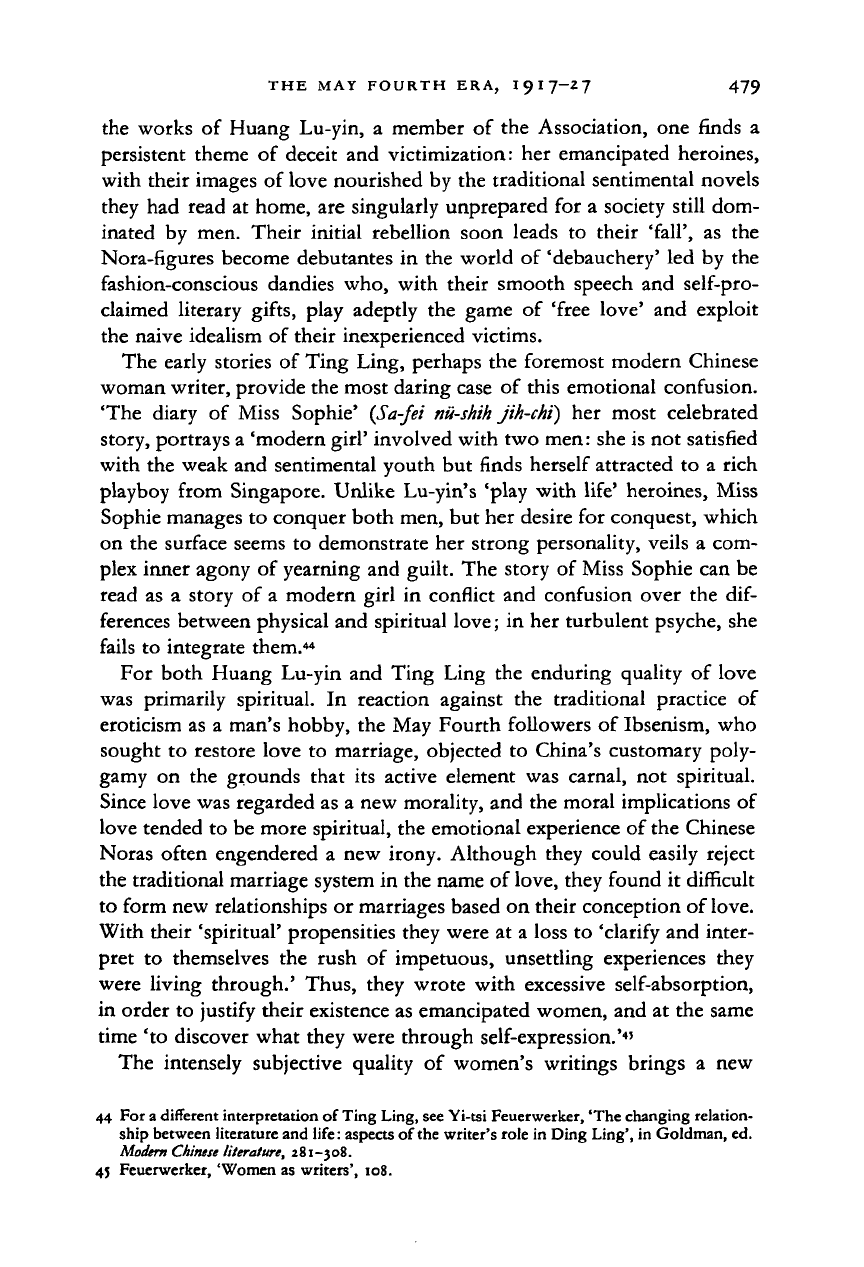
THE MAY FOURTH ERA, I 9 I 7-2 7 479
the works of Huang Lu-yin, a member of the Association, one finds a
persistent theme of deceit and victimization: her emancipated heroines,
with their images of love nourished by the traditional sentimental novels
they had read at home, are singularly unprepared for a society still dom-
inated by men. Their initial rebellion soon leads to their 'fall', as the
Nora-figures become debutantes in the world of 'debauchery' led by the
fashion-conscious dandies who, with their smooth speech and self-pro-
claimed literary gifts, play adeptly the game of 'free love' and exploit
the naive idealism of their inexperienced victims.
The early stories of Ting Ling, perhaps the foremost modern Chinese
woman writer, provide the most daring case of this emotional confusion.
'The diary of Miss Sophie' (Sa-fei
nii-shih
jih-chi) her most celebrated
story, portrays a 'modern girl' involved with two men: she is not satisfied
with the weak and sentimental youth but finds herself attracted to a rich
playboy from Singapore. Unlike Lu-yin's 'play with life' heroines, Miss
Sophie manages to conquer both men, but her desire for conquest, which
on the surface seems to demonstrate her strong personality, veils a com-
plex inner agony of yearning and guilt. The story of Miss Sophie can be
read as a story of a modern girl in conflict and confusion over the dif-
ferences between physical and spiritual love; in her turbulent psyche, she
fails to integrate them.
44
For both Huang Lu-yin and Ting Ling the enduring quality of love
was primarily spiritual. In reaction against the traditional practice of
eroticism as a man's hobby, the May Fourth followers of Ibsenism, who
sought to restore love to marriage, objected to China's customary poly-
gamy on the grounds that its active element was carnal, not spiritual.
Since love was regarded as a new morality, and the moral implications of
love tended to be more spiritual, the emotional experience of the Chinese
Noras often engendered a new irony. Although they could easily reject
the traditional marriage system in the name of love, they found it difficult
to form new relationships or marriages based on their conception of love.
With their 'spiritual' propensities they were at a loss to 'clarify and inter-
pret to themselves the rush of impetuous, unsettling experiences they
were living through.' Thus, they wrote with excessive self-absorption,
in order to justify their existence as emancipated women, and at the same
time 'to discover what they were through self-expression.'
4
'
The intensely subjective quality of women's writings brings a new
44 For a different interpretation of Ting Ling, see Yi-tsi Feuerwerker, 'The changing relation-
ship between literature and life: aspects of the writer's role in Ding Ling', in Goldman, ed.
Modem
Chinese
literature,
281-308.
45 Feuerwerker, 'Women as writers', 108.
Cambridge Histories Online © Cambridge University Press, 2008
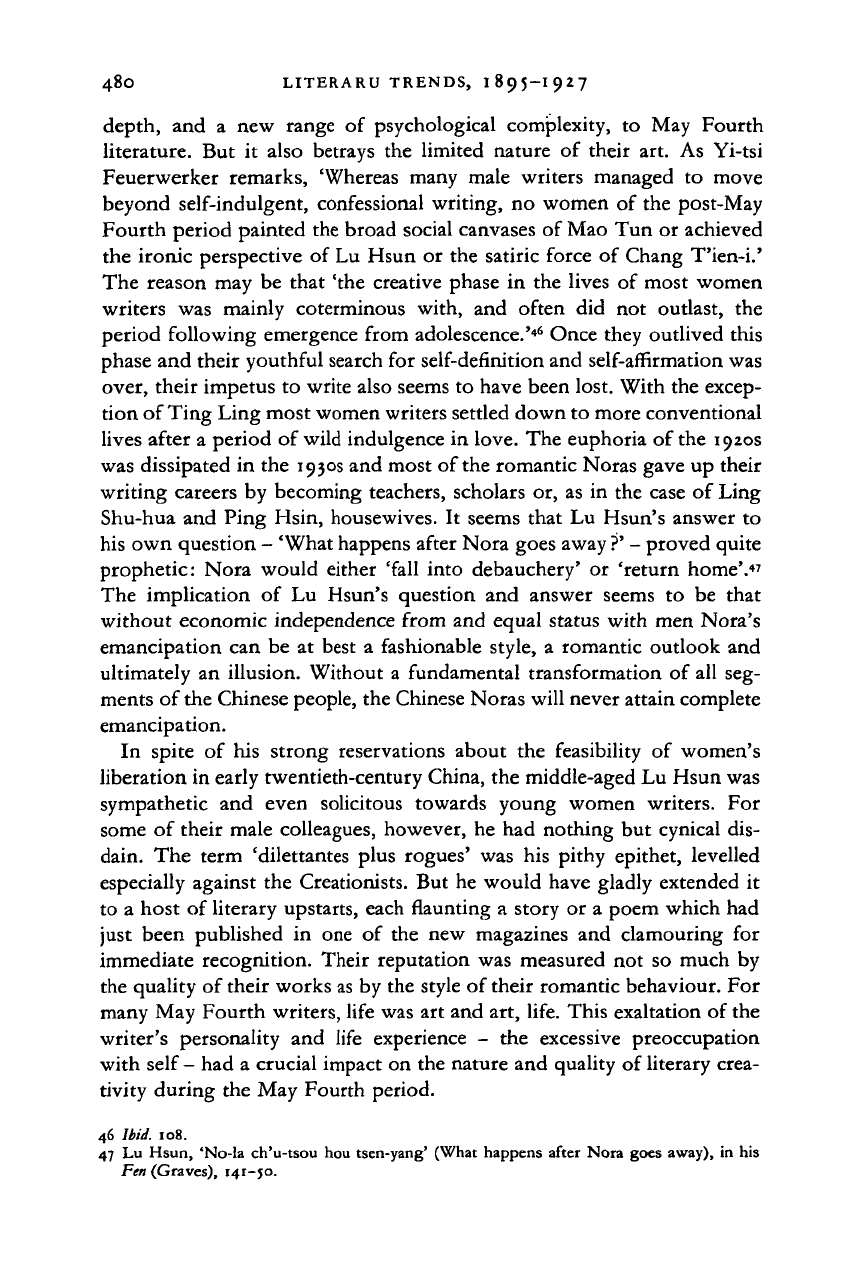
480 LITERARU TRENDS, 1895-1927
depth, and
a
new range
of
psychological complexity,
to
May Fourth
literature. But
it
also betrays the limited nature
of
their art. As Yi-tsi
Feuerwerker remarks, 'Whereas many male writers managed
to
move
beyond self-indulgent, confessional writing, no women
of
the post-May
Fourth period painted the broad social canvases of Mao Tun or achieved
the ironic perspective of Lu Hsun
or
the satiric force
of
Chang T'ien-i.'
The reason may be that 'the creative phase
in
the lives
of
most women
writers was mainly coterminous with,
and
often
did not
outlast,
the
period following emergence from adolescence.'
46
Once they outlived this
phase and their youthful search for self-definition and self-affirmation was
over, their impetus to write also seems to have been lost. With the excep-
tion of Ting Ling most women writers settled down to more conventional
lives after a period of wild indulgence in love. The euphoria of the 1920s
was dissipated in the 1930s and most of the romantic Noras gave up their
writing careers by becoming teachers, scholars or, as in the case of Ling
Shu-hua and Ping Hsin, housewives.
It
seems that Lu Hsun's answer
to
his own question
-
'What happens after Nora goes away
?'
-
proved quite
prophetic: Nora would either 'fall into debauchery'
or
'return home'.
47
The implication
of Lu
Hsun's question and answer seems
to be
that
without economic independence from and equal status with men Nora's
emancipation can be
at
best
a
fashionable style,
a
romantic outlook and
ultimately an illusion. Without
a
fundamental transformation of all seg-
ments of the Chinese people, the Chinese Noras will never attain complete
emancipation.
In spite
of
his strong reservations about
the
feasibility
of
women's
liberation in early twentieth-century China, the middle-aged Lu Hsun was
sympathetic
and
even solicitous towards young women writers.
For
some
of
their male colleagues, however, he had nothing but cynical dis-
dain. The term 'dilettantes plus rogues' was his pithy epithet, levelled
especially against the Creationists. But he would have gladly extended
it
to
a
host of literary upstarts, each flaunting
a
story or a poem which had
just been published
in
one
of
the new magazines and clamouring
for
immediate recognition. Their reputation was measured not so much by
the quality of their works as by the style of their romantic behaviour. For
many May Fourth writers, life was art and art, life. This exaltation of the
writer's personality and life experience
- the
excessive preoccupation
with self
-
had a crucial impact on the nature and quality of literary crea-
tivity during the May Fourth period.
46
Ibid.
108.
47 Lu Hsun, 'No-la ch'u-tsou hou tsen-yang' (What happens after Nora goes away),
in
his
Fen (Graves), 141-50.
Cambridge Histories Online © Cambridge University Press, 2008
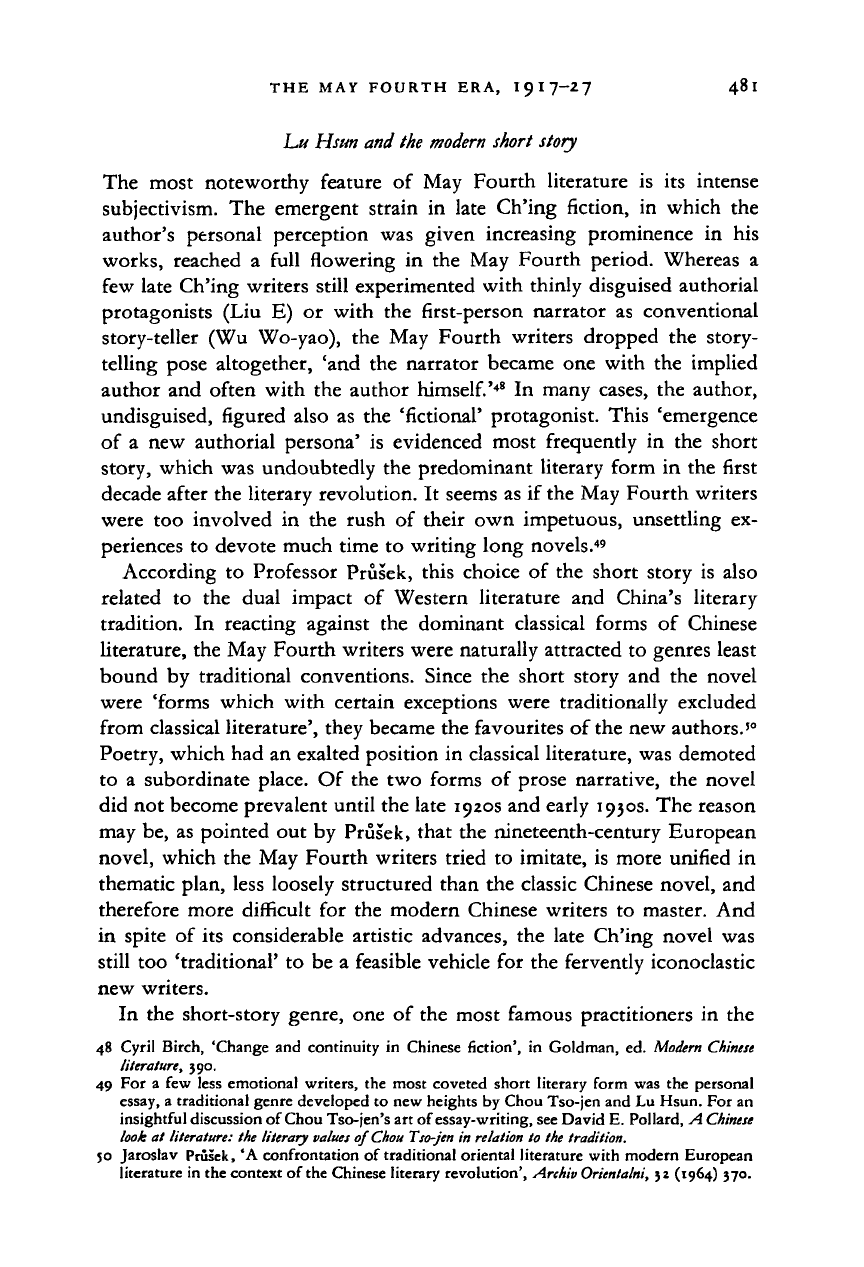
THE MAY FOURTH ERA, 1917-27 481
Lu Hsun and the
modern
short story
The most noteworthy feature of May Fourth literature is its intense
subjectivism. The emergent strain in late Ch'ing fiction, in which the
author's personal perception was given increasing prominence in his
works, reached a full flowering in the May Fourth period. Whereas a
few late Ch'ing writers still experimented with thinly disguised authorial
protagonists (Liu E) or with the first-person narrator as conventional
story-teller (Wu Wo-yao), the May Fourth writers dropped the story-
telling pose altogether, 'and the narrator became one with the implied
author and often with the author
himself.'
48
In many cases, the author,
undisguised, figured also as the 'fictional' protagonist. This 'emergence
of a new authorial persona' is evidenced most frequently in the short
story, which was undoubtedly the predominant literary form in the first
decade after the literary revolution. It seems as if the May Fourth writers
were too involved in the rush of their own impetuous, unsettling ex-
periences to devote much time to writing long novels.
49
According to Professor Prusek, this choice of the short story is also
related to the dual impact of Western literature and China's literary
tradition. In reacting against the dominant classical forms of Chinese
literature, the May Fourth writers were naturally attracted to genres least
bound by traditional conventions. Since the short story and the novel
were 'forms which with certain exceptions were traditionally excluded
from classical literature', they became the favourites of the new authors.'
0
Poetry, which had an exalted position in classical literature, was demoted
to a subordinate place. Of the two forms of prose narrative, the novel
did not become prevalent until the late 1920s and early 1930s. The reason
may be, as pointed out by Prusek, that the nineteenth-century European
novel, which the May Fourth writers tried to imitate, is more unified in
thematic plan, less loosely structured than the classic Chinese novel, and
therefore more difficult for the modern Chinese writers to master. And
in spite of its considerable artistic advances, the late Ch'ing novel was
still too 'traditional' to be a feasible vehicle for the fervently iconoclastic
new writers.
In the short-story genre, one of the most famous practitioners in the
48 Cyril Birch, 'Change and continuity in Chinese fiction', in Goldman, ed.
Modern Chinese
literature, 390.
49 For a few less emotional writers, the most coveted short literary form was the personal
essay, a traditional genre developed to new heights by Chou Tso-jen and Lu Hsun. For an
insightful discussion of Chou Tso-jen's art of essay-writing, see David E. Pollard, A
Chinese
look at
literature:
the literary
values
of
Chou Tso-jen
in
relation
to
the
tradition.
50 Jaroslav Prusek, 'A confrontation of traditional oriental literature with modern European
literature in the context of the Chinese literary revolution', Archie
Orientalni,
32 (1964) 370.
Cambridge Histories Online © Cambridge University Press, 2008
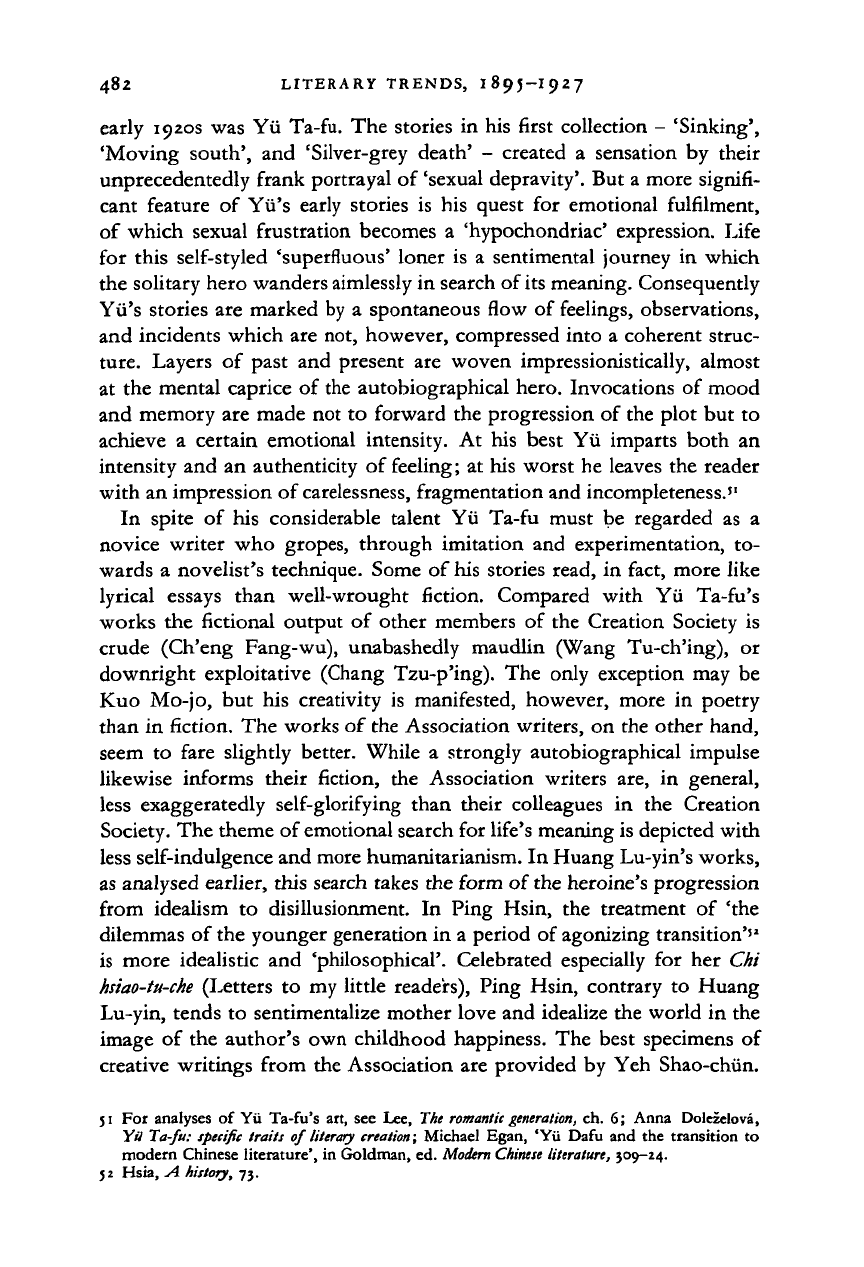
482 LITERARY TRENDS, 1895-I927
early 1920s was Yii Ta-fu. The stories in his first collection
-
'Sinking',
'Moving south', and 'Silver-grey death'
-
created
a
sensation
by
their
unprecedentedly frank portrayal of 'sexual depravity'. But a more signifi-
cant feature
of
Yii's early stories
is
his quest
for
emotional fulfilment,
of which sexual frustration becomes
a
'hypochondriac' expression. Life
for this self-styled 'superfluous' loner is
a
sentimental journey in which
the solitary hero wanders aimlessly in search of
its
meaning. Consequently
Yii's stories are marked by
a
spontaneous flow of feelings, observations,
and incidents which are not, however, compressed into
a
coherent struc-
ture.
Layers
of
past and present are woven impressionistically, almost
at the mental caprice of the autobiographical hero. Invocations of mood
and memory are made not to forward the progression of the plot but
to
achieve
a
certain emotional intensity.
At
his best Yii imparts both
an
intensity and an authenticity of feeling; at his worst he leaves the reader
with an impression of carelessness, fragmentation and incompleteness."
In spite
of
his considerable talent Yii Ta-fu must
be
regarded
as a
novice writer who gropes, through imitation and experimentation, to-
wards
a
novelist's technique. Some of his stories read, in fact, more like
lyrical essays than well-wrought fiction. Compared with
Yii
Ta-fu's
works the fictional output
of
other members
of
the Creation Society
is
crude (Ch'eng Fang-wu), unabashedly maudlin (Wang Tu-ch'ing),
or
downright exploitative (Chang Tzu-p'ing). The only exception may
be
Kuo Mo-jo, but his creativity
is
manifested, however, more
in
poetry
than in fiction. The works of the Association writers, on the other hand,
seem
to
fare slightly better. While
a
strongly autobiographical impulse
likewise informs their fiction,
the
Association writers are,
in
general,
less exaggeratedly self-glorifying than their colleagues
in the
Creation
Society. The theme of emotional search for life's meaning is depicted with
less self-indulgence and more humanitarianism. In Huang Lu-yin's works,
as analysed earlier, this search takes the form of the heroine's progression
from idealism
to
disillusionment.
In
Ping Hsin,
the
treatment
of
'the
dilemmas of the younger generation in a period of agonizing transition''
2
is more idealistic and 'philosophical'. Celebrated especially
for
her Chi
hsiao-tu-che
(Letters
to
my little readers), Ping Hsin, contrary
to
Huang
Lu-yin, tends to sentimentalize mother love and idealize the world in the
image
of
the author's own childhood happiness. The best specimens of
creative writings from the Association are provided by Yeh Shao-chun.
51 For analyses
of
Yii Ta-fu's art, see Lee, The
romantic
generation,
ch.
6;
Anna Dolezelova,
Yii Ta-fu:
specific
traits of
literary
creation; Michael Egan, 'Yu Dafu and the transition
to
modern Chinese literature', in Goldman, ed.
Modern Chinese
literature, 309-24.
52 Hsia,
A
history, 73.
Cambridge Histories Online © Cambridge University Press, 2008
